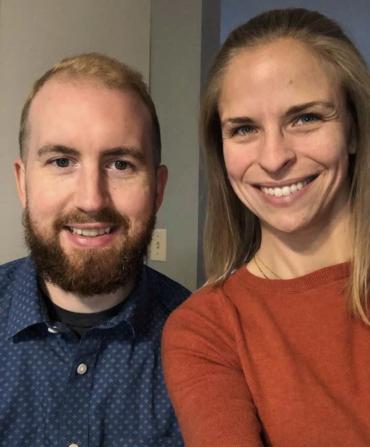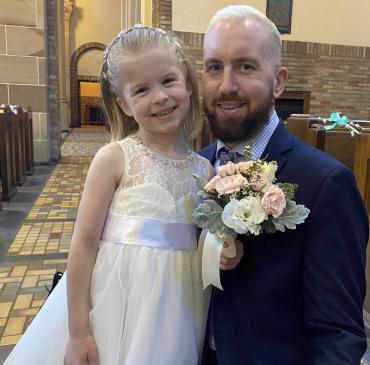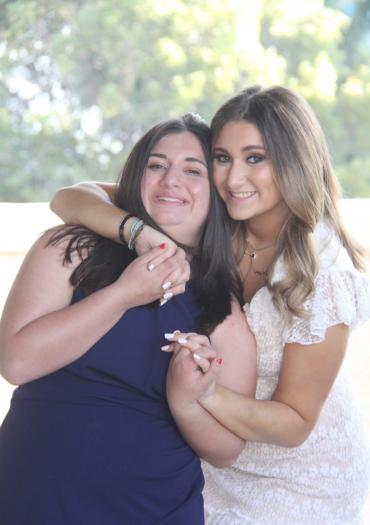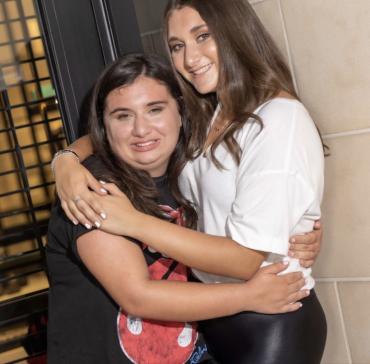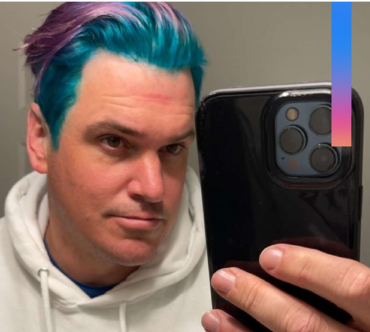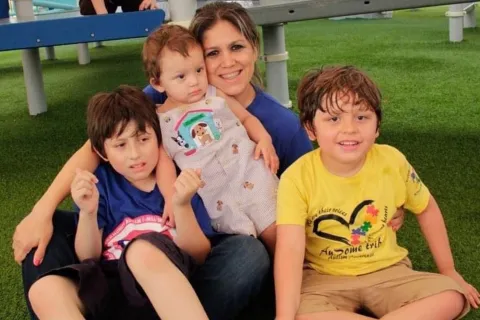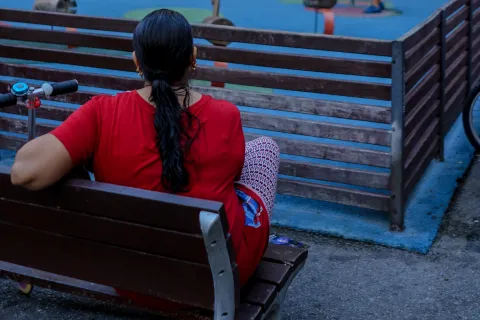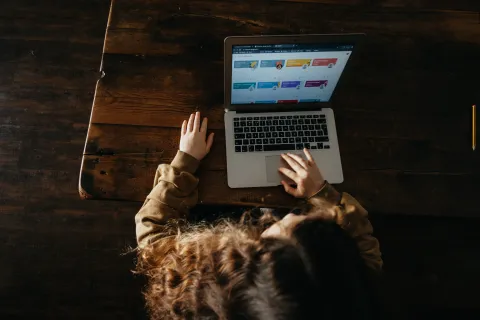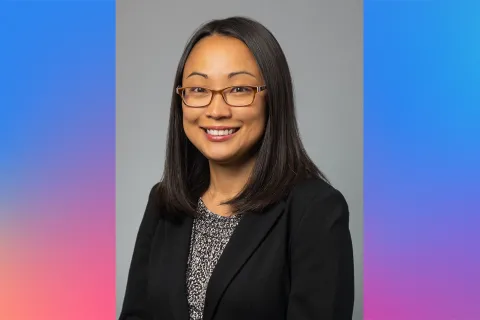Finding myself in autism
Meet Dorian M., 34
Virginia
I was diagnosed with autism at age 33. I was already married and had a 4-year-old child of my own at the time. I welcomed the diagnosis because it told me so much about myself although it did not come as much of a surprise to me. I always knew I was "a bit different" and it was never more apparent than during the pandemic of 2020.
I didn't mind being indoors and away from people at first. For me not having to go into an office every day and make small talk was refreshing, but about three months into quarantine, I started to notice I was suddenly struggling to maintain daily normalcy . I thrive on routine, and it was becoming increasingly difficult to hold routines. As a parent of a young child, being stuck inside caused immense overstimulation for me. I sought help to learn how to cope and that’s when I received my diagnosis.
Upon receiving the diagnosis, I felt as if a major question in life was answered, yet hundreds of others arose. I immediately made the decision to be open about my autism diagnosis and share my experience. My greatest struggle is also my greatest accomplishment in being a parent. It is not easy to be a parent, let alone an autistic parent. There aren’t a lot of resources out there to help steer you in the right direction.
During this Disability Pride Month, I am happy to say that I’m learning new things about myself every day and I continue to embrace it. My advice is to be as open with others as you can be. I felt alone but learned very quickly that I’m not alone at all – there’s a big community out there filled with other people just like me.
Hear more about Dorian’s new journey in this Q&A:
What does being autistic mean to you?
For me it mostly serves as an explanation for why I function the way I do. It answered so many questions I had never been able to answer up until this point in my life.
How does your autism make you unique?
I'm not sure that I am unique. For a very long time, I felt alone. It was like I was the only one that felt the way I did. After my autism diagnosis, I quickly learned there were many others like me. I suppose if I am looking for specifics, I do have an eidetic memory, I have always been a great poker player and I have a great story writing ability.
What advice do you have for other autistic people who might be looking for some words of encouragement?
When I first learned that I was autistic, I made the decision to be open about it. A few times I had people tell me they "were sorry" or that they "didn't think there was something wrong with me.” I’m sure they didn’t realize what they were saying could be hurtful but being autistic doesn't mean there is something wrong with you. Everyone in life has hurdles that they must overcome and learn to live with. If people have a social stigma about autism, then that is on them. Be proud of who you are.
Why is being an advocate and sharing your story so important to you?
For the most part, I am shy and reserved but I am rather successful in life. I have a great job and a loving family that supports me. I think that sharing my story will help those growing up autistic to see they can lead very functional and fulfilling lives with the right support group in place. I also think that a lot of parents panic when they learn their child is autistic, but the truth is they don't need to. I think by sharing my story it will help parents who might be struggling to come to terms with their child's diagnosis. I also hope to simply just spread awareness about autism in general.
What does disability pride month mean to you?
To me, it means that we as a world are moving towards more acceptance and understanding.
A sister’s view on autism and celebrating disability pride month: Meet Alexandra R., 16
Hi, I’m Ashley. I was inspired to write this blog for Disability Pride Month on behalf of my older sister, Alexandra, age 16. She was diagnosed with autism at three years of age, right around the time I was born. Obviously, I didn’t understand my sister was different or anything about autism for that matter at the time, I just knew she was my big sister, Alex, and I loved her.
As I got older, and could better understand Alex’s disabilities and social complications, I became much more protective and even more caring in a sense. Not only do I have a natural instinct to stand up for her, but for others who can’t necessarily stand up for themselves as well. It’s important to me to share my sister’s story because I want the world to know how special she is. She has a heart of gold and is capable of so many things. I want the world to know that all people with disabilities deserve an opportunity to reach their full potential.
Showing awareness during Disability Pride Month and being able to spread the word about autism means a lot to my family. Alexandra has a special independence and kindness about her that is indescribable. She’s just so strong and never lets anything stand in her way from achieving anything she puts her mind to. I’m not sure where I would be without my sister by my side.
Read more about Alexandra through her little sister’s words in this Q&A:
Can you share the moment when you first realized what autism was? When you were old enough to realize that your sister was autistic, what thoughts first ran through your mind?
When I first could get a sense of what it meant, I was still sort of confused. It took a while to really wrap my head around what autism is. My immediate thought was to be there for her and just protect her with all my power. She might be the big sister but I’m going to be here to be her protector.
What advice do you have for other siblings and family members with autism?
Just remember that everybody is different in their own way and people with autism are no exception. We need to remember to stay patient and just protect them in situations where they are unable to.
Why is being an advocate for your sister important to you?
Sharing Alex’s story is important to me because my sister is my entire world. I try to do everything in my power to show awareness and show that my sister is incredibly worthy of having whatever she wants in this world.
What has Alex taught you about yourself?
My sister Alex has inspired me beyond words. She has inspired me to be myself no matter who is around and to be honest to yourself as well as others.
Why is celebrating Disability Pride Month so important to you?
Disability Pride Month means spreading awareness to people who were born with disabilities and struggle in ways that many of us are not. To my family, DPM is a month for celebration of my sister and others with autism.
A light at the end of the tunnel: Meet Brian C., 37
Utah
Being autistic and asexual, I am an abstract and very unique individual. This is the first month I’ve ever celebrated Pride Month, so it means a lot to me to participate. Love is love.
I was diagnosed with autism when I was 25 years old. That diagnosis brought me so much relief and comfort. I finally had something to help explain why I felt and acted so differently than my peers while growing up. From the elementary playground where I often entertained myself and played differently than the other kids, to the battlegrounds of high school, and dating in my 20s where I was taken advantage of by someone who I thought cared for me, nothing ever was quite 'right.' I struggled with relationships and forming bonds and spent much of my youth and young adult years never feeling like I was good enough.
I fell into many dark years of drug and substance abuse, I was lost. Following my autism diagnosis though, I finally saw a light at the end of the tunnel. Something I had not seen in years. I entered rehab, began therapy and received a lot of support from those around me. I started asking for help and embracing all that made me, me. I was finally able to safely explore my identity, including my sexual orientation. After years of struggle, I was finally able to understand and make sense of my sexuality. I feel my best self when identifying as asexual, but more closely as demisexual.
Despite some setbacks, I have made amazing progress in my life. I have pushed through my trials and have found much success. I have discovered that I thrive in the entrepreneurial world and have started two of my own businesses, and also discovered my talent and love for music.
My advice to those who have been diagnosed later in life? Own your diagnosis and call it your super-power! Don’t react right away. Give everything time to sink in. It can be both overwhelming and comforting to realize why things never felt 'right.' It can be a shock to the system, but you got this! Accept yourself and that we are all a work in progress. Don’t stop moving forward. Figure out what that means for you and keep doing it!
I want to increase awareness about autism and to inform the community about all of the challenges faced by individuals with autism. People in the community and those who work with the public should learn the signs of autism and how to interact with a person with autism. Individuals with autism should be treated with respect. Increasing awareness of autism can contribute to the betterment of society.
Thank you Autism Speaks. Susan K. from the Autism Response Team is a very nice lady and was very helpful.

